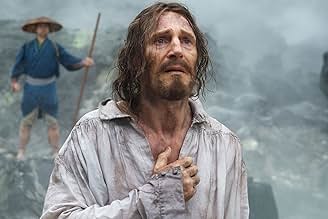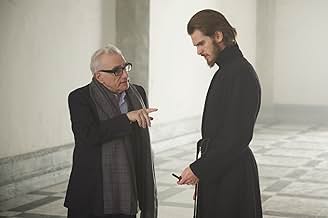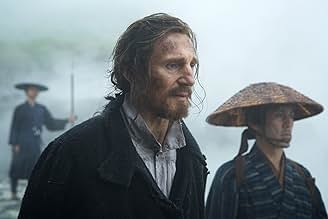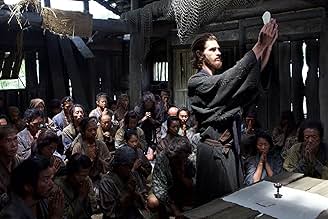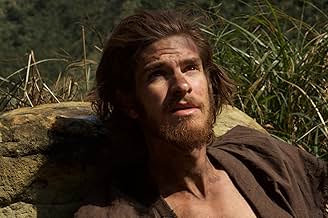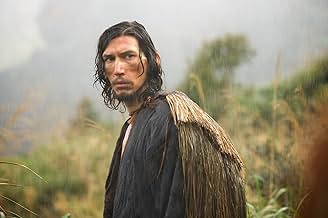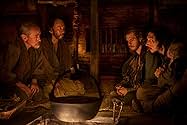Due preti gesuiti si recano in Giappone nel 17esimo secolo per trovare il proprio mentore e diffondere la parola di Dio.Due preti gesuiti si recano in Giappone nel 17esimo secolo per trovare il proprio mentore e diffondere la parola di Dio.Due preti gesuiti si recano in Giappone nel 17esimo secolo per trovare il proprio mentore e diffondere la parola di Dio.
- Regia
- Sceneggiatura
- Star
- Candidato a 1 Oscar
- 8 vittorie e 62 candidature totali
Issei Ogata
- Old Samurai
- (as Issey Ogata)
- …
Shin'ya Tsukamoto
- Mokichi
- (as Shinya Tsukamoto)
Yôsuke Kubozuka
- Kichijiro
- (as Yosuke Kubozuka)
Diego Calderón
- Prisoner Augustinian Friar #2
- (as Diego Calderon)
Panta
- Tomogi Villager #1 (Yohei)
- (as PANTA)
Recensioni in evidenza
There's a reasonable argument to say that SILENCE is one of Martin Scorsese's better movies. The talk is that it was a passion project of his for decades, finally being released in all it's artistic endeavors and mysteries. I suppose someone else could argue the opposite: that this is a story full of brutality and despair without the signature style of the aged director. I think I'm falling right on the middle on this one. This is surely one of the year's most powerful stories, and yet I have to admit it left me cold.
The story follows two priests from Portugal (Andrew Garfield and Adam Driver) who venture into hostile Japanese country in search of their mentor, Father Ferreira (Liam Neeson), who has abandoned his Christian faith. Some chalk it up to mere rumors. These two young ministers take the journey to find out for themselves.
What begins as a fairly traditional story ventures into the heart of Japan in the 16th Century with a sharp attention to both detail and horror. This is less a story of a search for one man as it is an odyssey into the despair found in conflicting religious beliefs. Father Rodrigues (Andrew Garfield) holds hope that Ferreira is alive while also working to convert as many locals under cover of darkness. Upon landing on the shores of Japan (smuggled in on small fishing boats from China), he encounters villages of faithful Christians who worship in secret. For them, the arrival of Rodrigues and Father Garupe (Driver) is confirmation of their beliefs. Through language barriers, it seems that God is always present.
As we delve further into the country towards Nagasaki (where Ferreira is said to be held), the two priest break off on separate journeys. Rodrigues, though oftentimes alone, is shadowed by a Japanese recluse named Kichijiro, a drunk who once betrayed his faith in order to spare his life (he witnessed the execution of his entire family) but returns to the faith time again in order to make Confession and amends with the Lord. Rodrigues continues to absolve him, and yet this is the slow unraveling of an aspect of this story: do the Japanese really comprehend the religion in the same way Westerners do?
There are three people who make this movie better than average: Andrew Garfield surely gives one of the year's best performances as a man trapped in his own personal Hell, forced to grapple between martyrdom and eternal damnation. It's a strong year for Garfield, getting accolades and Oscar buzz for his other leading role in 'Hacksaw Ridge.' Trust me, this is the better performance. Second is the skill of Martin Scorsese, who slowly paints a portrait of a time long forgot with such attention to tone. It's a horrifying and at times morbid story to sit through, but there was never a moment I found myself any less than fully-focused and contemplative.
Third is a surprise, a breakthrough performance by a Japanese actor named Issey Ogata who gives without a doubt one of the year's most memorable performances. Throughout the film the Christians living in Japan are routinely inspected by samurai officials who intend to hunt down and capture any found citizens in violation of the law. One such official is Inoue Masashige (Ogata) who treats the job with a certain flair. Constantly waving a fan and with an ear to ear smile, this is a performance that steps above the rest of the cast by perfectly encapsulating the braggadocious nature of Japanese law without missing a beat. It's a winking devil performance that I hope the Oscars won't look over.
'Silence' is at times hard to palpate and yet rewards the audience for it's patience. Whether or not this film can be interpreted as being pro or anti-Catholic is maybe not the ultimate message of this film. While the final act delves into a horrifyingly-dark arena, consider the final shot before the credits begin to role (I won't spoil it). In such a brutal era with antiquated customs, isn't there still hope left to be found?
The story follows two priests from Portugal (Andrew Garfield and Adam Driver) who venture into hostile Japanese country in search of their mentor, Father Ferreira (Liam Neeson), who has abandoned his Christian faith. Some chalk it up to mere rumors. These two young ministers take the journey to find out for themselves.
What begins as a fairly traditional story ventures into the heart of Japan in the 16th Century with a sharp attention to both detail and horror. This is less a story of a search for one man as it is an odyssey into the despair found in conflicting religious beliefs. Father Rodrigues (Andrew Garfield) holds hope that Ferreira is alive while also working to convert as many locals under cover of darkness. Upon landing on the shores of Japan (smuggled in on small fishing boats from China), he encounters villages of faithful Christians who worship in secret. For them, the arrival of Rodrigues and Father Garupe (Driver) is confirmation of their beliefs. Through language barriers, it seems that God is always present.
As we delve further into the country towards Nagasaki (where Ferreira is said to be held), the two priest break off on separate journeys. Rodrigues, though oftentimes alone, is shadowed by a Japanese recluse named Kichijiro, a drunk who once betrayed his faith in order to spare his life (he witnessed the execution of his entire family) but returns to the faith time again in order to make Confession and amends with the Lord. Rodrigues continues to absolve him, and yet this is the slow unraveling of an aspect of this story: do the Japanese really comprehend the religion in the same way Westerners do?
There are three people who make this movie better than average: Andrew Garfield surely gives one of the year's best performances as a man trapped in his own personal Hell, forced to grapple between martyrdom and eternal damnation. It's a strong year for Garfield, getting accolades and Oscar buzz for his other leading role in 'Hacksaw Ridge.' Trust me, this is the better performance. Second is the skill of Martin Scorsese, who slowly paints a portrait of a time long forgot with such attention to tone. It's a horrifying and at times morbid story to sit through, but there was never a moment I found myself any less than fully-focused and contemplative.
Third is a surprise, a breakthrough performance by a Japanese actor named Issey Ogata who gives without a doubt one of the year's most memorable performances. Throughout the film the Christians living in Japan are routinely inspected by samurai officials who intend to hunt down and capture any found citizens in violation of the law. One such official is Inoue Masashige (Ogata) who treats the job with a certain flair. Constantly waving a fan and with an ear to ear smile, this is a performance that steps above the rest of the cast by perfectly encapsulating the braggadocious nature of Japanese law without missing a beat. It's a winking devil performance that I hope the Oscars won't look over.
'Silence' is at times hard to palpate and yet rewards the audience for it's patience. Whether or not this film can be interpreted as being pro or anti-Catholic is maybe not the ultimate message of this film. While the final act delves into a horrifyingly-dark arena, consider the final shot before the credits begin to role (I won't spoil it). In such a brutal era with antiquated customs, isn't there still hope left to be found?
This was Martin Scorsese's passion project. The reason he waited so long was because he didn't feel like he was ready. But when he finally made it, it bombed. Silence is a deconstruction and an examination of faith and spirituality. It's long, patient, quiet, slow. Thus, by the end of the film you will be exhausted. Andrew Garfield gives one his best performances, watching his soul gradually crumble was nothing short of heartbreaking. Adam Driver and Liam Neeson were great as well. Silence is a film not to be played as background noise. It's very hard to watch at points. But if your patient and committed to view it in it's entirety, you'll find something immensely rewarding. Silence is Scorsese's most underrated film, as well as one of the most underrated films of the 21st century.
With regards to Martin Scorsese's SILENCE, let me just put it this way, I saw Scorsese's 1988's "The Last Temptation Of Christ," back when I was in college, as you know that film was also an adaptation, and I thought it was pure masterpiece just in terms of its themes because whether or not you'd want to argue that perhaps that some of the approach may have been sacrilegious or religiously inconsiderate, if you will, to me it was about wondering the what if's and whether or not doubt has any footing in order for faith to grow. To a certain extent, SILENCE conveys something similar.
Based on Shusaku Endo's novel, SILENCE is about two Jesuit missionaries who travel to Japan because they have heard that their mentor, Father Ferreira (Liam Neeson) has publicly denounced God. At the time, Christianity was outlawed in Japan, so in their search for their missing mentor, they endure torture, suffering, and the ultimate test of faith.
In a way you could say that SILENCE is Martin Scorsese's way of paying respect to the legendary filmmaker Akira Kurosawa especially for us fans who grew up watching old time Japan's samurai classics, although SILENCE is not action-driven obviously, but the authoritarian rule depicted in this film is definitely something that's culturally based on that particular era.
From technical standpoint, SILENCE is as rich and complex as the story itself, even the violence is done in a graphic yet artistic manner. Because the story is told through Andrew Garfield's Father Rodrigues' perspective, you'll find some of the shots from inside his prison cell, looking out, with the frame being in between the wooden bars, to be quite engrossing. It makes the tension all the more real because your mind just keeps racing, you don't know how much more gruesome it would get. Odd to say this but it sort of becomes a point of anticipation, it's as if every other half-hour or so, you know some Christians are going to get tortured and so you're just bracing for impact. Martin Scorsese's ever-so-reliable high standard quality filmmaking is present through and through, so there's no disappointing you there.
After being religious and full of conviction in "Hacksaw Ridge" as a Seventh-Day Adventist, actor Andrew Garfield becomes religious and full of conviction again, this time in "Silence" and what's interesting is that both films feature Japanese people. All that aside, this is yet another evidence of Garfield's commitment to his work, the same goes for Adam Driver and Liam Neeson who not only went through physical changes, you actually feel a bit concerned for their health, but that conviction is shown in their eyes. It's amazing to see how this former Spider-Man quickly this powerful force. The Japanese actors are equally outstanding, especially Issey Ogata whose performance has his own flamboyant way of being ruthless.
This is Scorsese's long passion project, he had been wanting to do this film for years, but the question remains, and those of you who've watched the film are probably wondering it as well. And my answer is no, I don't think SILENCE means to demonize Buddhism. If this film is Scorsese's way of promoting Christianity, then that is his prerogative. But throughout mankind's history, there had been many cases in many lands where the majority religion, whatever religion that maybe, persecutes the minority religion because they view them as a dangerous threat; a symbol of a potential takeover. Inquisitions have happened everywhere. Which leads me back to what I said earlier about how SILENCE reminds me a lot of "The Last Temptation Of Christ," we see men who are supposed to be like rocks, seemingly falter and start to question their faith, but perhaps questioning your faith is one way of reaffirming it. Liam Neeson's character in this film has a counter argument to Andrew Garfield's Rodrigues and he may make a bit of sense if you see it from his version of truth.
-- Rama's Screen --
Based on Shusaku Endo's novel, SILENCE is about two Jesuit missionaries who travel to Japan because they have heard that their mentor, Father Ferreira (Liam Neeson) has publicly denounced God. At the time, Christianity was outlawed in Japan, so in their search for their missing mentor, they endure torture, suffering, and the ultimate test of faith.
In a way you could say that SILENCE is Martin Scorsese's way of paying respect to the legendary filmmaker Akira Kurosawa especially for us fans who grew up watching old time Japan's samurai classics, although SILENCE is not action-driven obviously, but the authoritarian rule depicted in this film is definitely something that's culturally based on that particular era.
From technical standpoint, SILENCE is as rich and complex as the story itself, even the violence is done in a graphic yet artistic manner. Because the story is told through Andrew Garfield's Father Rodrigues' perspective, you'll find some of the shots from inside his prison cell, looking out, with the frame being in between the wooden bars, to be quite engrossing. It makes the tension all the more real because your mind just keeps racing, you don't know how much more gruesome it would get. Odd to say this but it sort of becomes a point of anticipation, it's as if every other half-hour or so, you know some Christians are going to get tortured and so you're just bracing for impact. Martin Scorsese's ever-so-reliable high standard quality filmmaking is present through and through, so there's no disappointing you there.
After being religious and full of conviction in "Hacksaw Ridge" as a Seventh-Day Adventist, actor Andrew Garfield becomes religious and full of conviction again, this time in "Silence" and what's interesting is that both films feature Japanese people. All that aside, this is yet another evidence of Garfield's commitment to his work, the same goes for Adam Driver and Liam Neeson who not only went through physical changes, you actually feel a bit concerned for their health, but that conviction is shown in their eyes. It's amazing to see how this former Spider-Man quickly this powerful force. The Japanese actors are equally outstanding, especially Issey Ogata whose performance has his own flamboyant way of being ruthless.
This is Scorsese's long passion project, he had been wanting to do this film for years, but the question remains, and those of you who've watched the film are probably wondering it as well. And my answer is no, I don't think SILENCE means to demonize Buddhism. If this film is Scorsese's way of promoting Christianity, then that is his prerogative. But throughout mankind's history, there had been many cases in many lands where the majority religion, whatever religion that maybe, persecutes the minority religion because they view them as a dangerous threat; a symbol of a potential takeover. Inquisitions have happened everywhere. Which leads me back to what I said earlier about how SILENCE reminds me a lot of "The Last Temptation Of Christ," we see men who are supposed to be like rocks, seemingly falter and start to question their faith, but perhaps questioning your faith is one way of reaffirming it. Liam Neeson's character in this film has a counter argument to Andrew Garfield's Rodrigues and he may make a bit of sense if you see it from his version of truth.
-- Rama's Screen --
To this day, Martin Scorsese remains my all-time favourite director, a man whose approach to cinema completely differs to others in Hollywood, his appreciation towards cinema as an art form is his finest quality in what makes him arguably the greatest film director around. With 'Silence' promoted as Scorsese's 20-year passion project, it was a film I couldn't resist seeing, the legend back behind the camera focusing on a subject not fully studied in cinema, a subject that's mostly misunderstood.
I want to start with my conclusion and go from there. 'Silence' won't be everybody's film, the same way other ambitious films like 'The Revenant' or 'The Tree of Life' weren't, however despite my respect to Scorsese's mastery and level of detail, in my own honest opinion I believe this film fell short due to the lack of insight into it's main theme and thus instead transformed into a slow and somewhat dreary tale that arguably didn't need it's near 3-hour running time to tell its tale.
Now don't get me wrong, in regards to the film's craft it is a masterpiece, the cinematography is raw and epic, the direction from Scorsese is phenomenal and the set design is gorgeous. Accompanying this are a series of fine performances, most notably from Andrew Garfield who should receive monumental praise for his role, I haven't seen such a visceral performance in years, the raw emotion is uncanny. But unfortunately the technicalities and craft can't cover up the flaws that lie in the running time and the tediously slow plot that didn't want to end.
If there's anything I can leave you with from this review to help you decide as to whether it's a worthy watch or not, let me just say this: 'Silence' isn't a piece of entertainment, it's instead an experience; and whilst a technically masterful one at that, many audience members may find themselves slowly drifting off to sleep - as my neighbour in the cinema did. It isn't really a case of liking it or disliking it, it's more a case of the adventure, and despite my partial disappointment with it, the adventure was more than worthy enough for the viewing. Scorsese is still an exquisite auteur, flaws or not.
I want to start with my conclusion and go from there. 'Silence' won't be everybody's film, the same way other ambitious films like 'The Revenant' or 'The Tree of Life' weren't, however despite my respect to Scorsese's mastery and level of detail, in my own honest opinion I believe this film fell short due to the lack of insight into it's main theme and thus instead transformed into a slow and somewhat dreary tale that arguably didn't need it's near 3-hour running time to tell its tale.
Now don't get me wrong, in regards to the film's craft it is a masterpiece, the cinematography is raw and epic, the direction from Scorsese is phenomenal and the set design is gorgeous. Accompanying this are a series of fine performances, most notably from Andrew Garfield who should receive monumental praise for his role, I haven't seen such a visceral performance in years, the raw emotion is uncanny. But unfortunately the technicalities and craft can't cover up the flaws that lie in the running time and the tediously slow plot that didn't want to end.
If there's anything I can leave you with from this review to help you decide as to whether it's a worthy watch or not, let me just say this: 'Silence' isn't a piece of entertainment, it's instead an experience; and whilst a technically masterful one at that, many audience members may find themselves slowly drifting off to sleep - as my neighbour in the cinema did. It isn't really a case of liking it or disliking it, it's more a case of the adventure, and despite my partial disappointment with it, the adventure was more than worthy enough for the viewing. Scorsese is still an exquisite auteur, flaws or not.
It begins with a cacophonous medley of environmental sounds, such as crickets chirping, before cutting to absolute silence and the title. And then to a shot of severed heads. Perhaps this is Scorsese adding in some of his signature bits of artistic representations and violence. But what follows is an excruciating exercise in repetition, as faith is tested again and again for nearly three hours, with a relentlessness better reserved for succinct motifs, not heavy-handed, protracted lessons on religious dogmata.
"There's little peace for us now." The progress of spreading Christianity in Japan has been halted by persecution and destruction. The remaining padres have - along with their followers - been brutally murdered. Some even ask to be tortured to demonstrate their faith in God, but the end result is the same.
When a letter reaches Father Valignano (Ciaran Hinds), purporting that one of the strongest of all priests, Father Ferreira (Liam Neeson), has apostatized and taken up a Japanese wife, two young padres refuse to accept such an unequivocal falsity. Resolute in clearing his name, they determine to make the hazardous journey to Japan to find out the truth about Ferreira's whereabouts. Father Garrpe (Adam Driver) and Father Rodrigues (Andrew Garfield) were directly under his tutelage, and so procure a Japanese man, Kichijiro (Yosuke Kubozuka), living in Macao, to aid in their smuggling onto the island.
By 1640, Garrpe and Rodrigues are the last two priests to witness the aftermath of the 20 years of Jesuit persecution in Japan. They make their way to the tiny village of Tomogi before moving on to Goto, where remnants of Christian believers still secretly practice their faith. They must hide during the day and hold mass in the dead of night, always in fear of being found out by the Inquisitor (Issei Ogata), an elderly, somewhat comical man charged with seeking out and eradicating the perceived threat of Christianity.
"Silence" does exhibit stellar performances, especially when it comes to exceptional courage through unshakeable beliefs (Driver being far more convincing than Garfield, in appearance and speech). There are also opportunities for contrasts and fluctuations in adherence to such religious principles, particularly with Kichijiro, who comes to represent many of the failed ideologies mistranslated or misunderstood in proliferating a system so fundamentally alien to many of the formerly Buddhist inhabitants. Doubt also creeps in, as Garrpe grows impatient and Rodrigues questions the illusory habits of a deity that unexplainably remains absent in the most anguishing of times. The two priests, along with most of the villagers, are desperate for tangible signs of faith - signs that occasionally become more valuable than faith itself.
In this perpetual search for validation and proof of God's omniscience, there are numerous sequences of profound conviction, made more striking by the increasing pitifulness of the survivors and the escalation of tortures inflicted on those who refuse to renounce the invading religion. But, correspondingly, in this indulgent, overlong epic of potent morals, where the individualization of religious implications routinely trumps the bigger picture (along the lines of the infuriating yet purposeful justifications seen in "A Man for All Seasons"), there's fleeting entertainment value to be found. It's a historical lecture more than a moving examination of theological unity or human weakness, and surely a plodding series of reiterations on shaping spirituality through pain and fear. It's not quite the "priestsploitation" nonsense that it could have been, but it's nevertheless redundant, light on engaging drama, heavy on physical and psychological trials, and sparse on monumental ideas. Particularly with its finale, "Silence" attempts to think for the audience, so that they don't have to strain to uncover subtle genuineness; religious viewers will certainly interpret various sequences to a greater (or different) degree than those without perspectives comparable to the characters on screen.
"There's little peace for us now." The progress of spreading Christianity in Japan has been halted by persecution and destruction. The remaining padres have - along with their followers - been brutally murdered. Some even ask to be tortured to demonstrate their faith in God, but the end result is the same.
When a letter reaches Father Valignano (Ciaran Hinds), purporting that one of the strongest of all priests, Father Ferreira (Liam Neeson), has apostatized and taken up a Japanese wife, two young padres refuse to accept such an unequivocal falsity. Resolute in clearing his name, they determine to make the hazardous journey to Japan to find out the truth about Ferreira's whereabouts. Father Garrpe (Adam Driver) and Father Rodrigues (Andrew Garfield) were directly under his tutelage, and so procure a Japanese man, Kichijiro (Yosuke Kubozuka), living in Macao, to aid in their smuggling onto the island.
By 1640, Garrpe and Rodrigues are the last two priests to witness the aftermath of the 20 years of Jesuit persecution in Japan. They make their way to the tiny village of Tomogi before moving on to Goto, where remnants of Christian believers still secretly practice their faith. They must hide during the day and hold mass in the dead of night, always in fear of being found out by the Inquisitor (Issei Ogata), an elderly, somewhat comical man charged with seeking out and eradicating the perceived threat of Christianity.
"Silence" does exhibit stellar performances, especially when it comes to exceptional courage through unshakeable beliefs (Driver being far more convincing than Garfield, in appearance and speech). There are also opportunities for contrasts and fluctuations in adherence to such religious principles, particularly with Kichijiro, who comes to represent many of the failed ideologies mistranslated or misunderstood in proliferating a system so fundamentally alien to many of the formerly Buddhist inhabitants. Doubt also creeps in, as Garrpe grows impatient and Rodrigues questions the illusory habits of a deity that unexplainably remains absent in the most anguishing of times. The two priests, along with most of the villagers, are desperate for tangible signs of faith - signs that occasionally become more valuable than faith itself.
In this perpetual search for validation and proof of God's omniscience, there are numerous sequences of profound conviction, made more striking by the increasing pitifulness of the survivors and the escalation of tortures inflicted on those who refuse to renounce the invading religion. But, correspondingly, in this indulgent, overlong epic of potent morals, where the individualization of religious implications routinely trumps the bigger picture (along the lines of the infuriating yet purposeful justifications seen in "A Man for All Seasons"), there's fleeting entertainment value to be found. It's a historical lecture more than a moving examination of theological unity or human weakness, and surely a plodding series of reiterations on shaping spirituality through pain and fear. It's not quite the "priestsploitation" nonsense that it could have been, but it's nevertheless redundant, light on engaging drama, heavy on physical and psychological trials, and sparse on monumental ideas. Particularly with its finale, "Silence" attempts to think for the audience, so that they don't have to strain to uncover subtle genuineness; religious viewers will certainly interpret various sequences to a greater (or different) degree than those without perspectives comparable to the characters on screen.
- The Massie Twins
What Scorsese Film Ranks Highest on IMDb?
What Scorsese Film Ranks Highest on IMDb?
Cinema legend Martin Scorsese has directed some of the most acclaimed films of all time. See how IMDb users rank all of his feature films as director.
Lo sapevi?
- QuizAdam Driver lost 50 pounds for the role; 30 before filming, and 20 during filming.
- BlooperIn the scene where Rodrigues and his Translator meet Garupe on the beach, Just after Garupe jumps into the ocean and starts to swim, The Translator is saying dialogue but his lips are not moving for most of the spoken line, and what is spoken does not match his lip movements.
- Curiosità sui creditiThere was no music during the closing credits. The music was replaced by the sounds of the sea, a storm and the sounds of nature. This is in keeping with the deep ties Japan has with nature.
- ConnessioniFeatured in Roeper's Reviews: Richard Roeper's Top 16 Films for 2016 (2016)
- Colonne sonoreFrancesco's Cosmic Beam Experience (live, Marina Del Rey)
Composed and performed by Francesco Lupica
I più visti
Accedi per valutare e creare un elenco di titoli salvati per ottenere consigli personalizzati
- How long is Silence?Powered by Alexa
Dettagli
Botteghino
- Budget
- 46.000.000 USD (previsto)
- Lordo Stati Uniti e Canada
- 7.100.177 USD
- Fine settimana di apertura Stati Uniti e Canada
- 130.880 USD
- 25 dic 2016
- Lordo in tutto il mondo
- 23.834.809 USD
- Tempo di esecuzione
- 2h 41min(161 min)
- Colore
- Mix di suoni
- Proporzioni
- 2.35 : 1
Contribuisci a questa pagina
Suggerisci una modifica o aggiungi i contenuti mancanti







